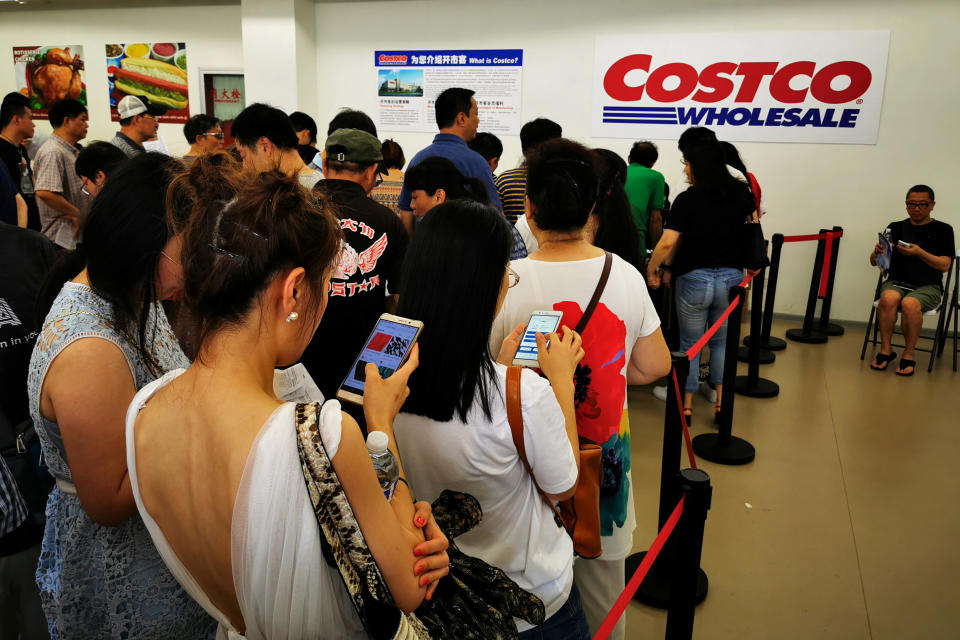No evidence American companies are leaving China: US-China Business Council
U.S. companies with footprints in China are still committed to the second-largest economy in the world, despite ongoing trade tensions between Washington and Beijing and President Donald Trump’s tweet calling for U.S. firms to leave China.
Eighty-two percent of surveyed companies see China as one of their strategic priorities, according to the US-China Business Council’s (USCBC) annual member company survey released on Thursday. USCBC represents American companies that conduct business in China, including prominent players like Amazon (AMZN), Facebook (FB), General Motors (GM) and Walmart (WMT).
American companies surveyed largely find the Chinese market lucrative, as 97% said they are profitable in China. The number of respondents reporting a profit margin rate for their China operations that is higher than that of their overall operations jumped to 46% from 38% in 2019.

“We don't see a great deal of evidence that our members are leaving China at all. Rather, investments in China are healthy. Most American companies said they understand that China will remain one of the primary engines of global growth for the foreseeable future,” said Craig Allen, the president of USCBC.
But the optimism in China is waning as the U.S.-China trade war escalates and the protectionism in the domestic market persists. The percentage of respondents who see their revenue decreasing hit a record high of 26%, while 17% said that they have reduced or stopped planned investment in China. And a record low of 22% said that they were optimistic about the five-year outlook.
American brands are still largely welcomed in China for their quality and prestige, despite rising nationalism sentiment towards the U.S. When Costco opened its first store in Shanghai this week, it had to close its doors within a few hours of its debut due to a flood of customers into the store. Beijing has carefully downplayed any negative U.S. sentiment, so it hasn’t threatened American consumer product sales yet.
“I think that there is a sense among our membership, that the Chinese government views the U.S.-China relationship is critically important in the future. And they want to refrain from overly and negatively impacting the sentiments of the Chinese citizen to a point where it would be difficult to change those perspectives going forward,” said Jake Parker, senior vice president at USCBC.
Supply chain shift is real

American companies focusing on selling to Chinese consumers may have good reasons to stay as the middle class keeps growing. But for those who merely use China as a manufacturing or sourcing hub, the supply chain shift is accelerating due to tariffs and export controls from both sides.
In a tweetstorm targeting China last Friday, President Trump said American companies “are hereby ordered to immediately start looking for an alternative to China, including bringing your companies home and making your products in the USA”.
While the order surprised many, it shed light on what U.S. businesses have already been doing. On its earnings call on Thursday, BestBuy said many of its vendors are in the process of migrating the manufacturing out of China.
“There are supply chain adjustments happening all the time. And particularly, we see for multiple reasons, especially increasing cost of labor in China, that a lot of the more labor-intensive assembly type of operations are leaving. And perhaps that has been accelerated as a result of the tariffs,” said Allen. “And it is clear that the export controls are having an effect on high tech industries, particularly in the telecom semiconductor and electronic sectors.”
Allen believes Trump is using aggressive rhetoric to push the opening up of and reform of the Chinese market, instead of forcing American businesses out of China.
“We do not believe that he [Trump] wishes to encourage other American companies that have successful operations in China to leave,” said Allen. “And so our members are in China for the long term. None of them are anticipating orders to leave.”
Krystal Hu covers technology and China for Yahoo Finance. Follow her on Twitter.
Read more:



